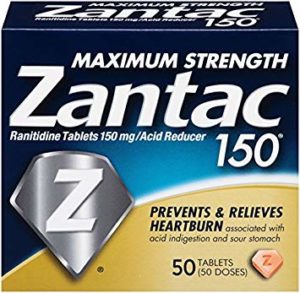(Feb. 22, 2020)  Heartburn drug Zantac cancer cases have been moved to a new federal multidistrict litigation (MDL) court set up in Florida. U.S. District Judge Robin L. Rosenberg in West Palm Beach has been assigned to oversee dozens of lawsuits leveled against the makers of Zantac (ranitidine).
Heartburn drug Zantac cancer cases have been moved to a new federal multidistrict litigation (MDL) court set up in Florida. U.S. District Judge Robin L. Rosenberg in West Palm Beach has been assigned to oversee dozens of lawsuits leveled against the makers of Zantac (ranitidine).
The Problem with Zantac
The problem with Zantac first came to the public’s attention on September 13, 2019, when the FDA reported Zantac (ranitidine) was contaminated with the carcinogen N-nitrosodimethylamine (NDMA). It’s a problem that could concern many people, because Zantac is a common heartburn medication available in both prescription and over-the-counter (OTC) versions.
The FDA advisory claims the level of contamination is “low”; however, the levels found by other entities show contamination 3,000 to 26,000 times higher than what the FDA has determined to be “safe.”
Zantac Cancer Lawsuits
The first Zantac lawsuit was filed in California on the same day the FDA issued its advisory. Plaintiffs in that case, and in the more than 140 Zantac cancer cases filed since, name drug makers Sanofi and Boerhringer Ingelheim as defendants. The lawsuit complaints accuse the Big Pharma giants of manufacturing, marketing, and selling a product they knew or should have known had been contaminated with an industrial chemical known to cause cancer. Zantac may raise the risk of several types of cancer, including:
* Bladder Cancer
* Stomach Cancer
* Kidney Cancer
* Liver Cancer
* Prostate Cancer
Though the exact cause of the NDMA contamination is still being investigated, when Boerhinger Ingelheim and Sanofi were making and marketing Zantac, scientific research demonstrated a clear link between Zantac’s active ingredient ranitidine and NDMA. Research shows that when ranitidine meets water, a chemical reaction results to form NDMA.
The makers of Zantac (ranitidine) knew or should have known of this fact, yet they chose not to disclose the risks to government regulators (like the FDA) or to consumers.
Zantac MDL Court Formed
On Feb. 6, 2020, a federal judge panel assigned the Zantac cancer cases to a single judge for pretrial matters. U.S. District Judge Robin L. Rosenberg will set the ground rules as attorneys from across the country attempt to determine what, when, and how much the drug companies knew about the alleged carcinogen in their product.
Judge Rosenberg, an Obama-era appointee, has been on the bench for six years. The Zantac Multidistrict litigation will be her first time to lead the MDL process.
Multidistrict litigation is set up to allow judges to bundle nationwide, complex lawsuits together, and assign them to a single judge for pretrial matters.
100,000 Zantac Claimants?
Some plaintiffs’ lawyers believe the Zantac (ranitidine) MDL will be the the largest multidistrict litigation in the history of the U.S. One Florida attorney predicts the Zantac MDL court could see more than 100,000 claimants.
NDMA – Extremely Hazardous
According to the U.S. National Library of Medicine, NDMA’s primary use is “in laboratory research to induce tumors in experimental animals.”
NDMA is also used in aviation and rocket fuel and industrial lubricants. It is also a by-product of several industrial processes, including gasoline refining and the treatment of wastewater containing nitrogen.
NDMA may also be found in several food products, such as cured meats. It is also an ingredient in tobacco fumes. NDMA does not appear to accumulate in tissues.
Under the federal Emergency Planning and Community Right-to-Know Act of 1986 (EPCRA), NDMA is classified as “extremely hazardous.” As a result, stringent reporting requirements obtain for companies and individuals who produce, store, or use NDMA in large amounts.
The FDA has set a daily intake limit of NDMA for the general public at 96 nanograms a day, which is particularly concerning considering the findings of Valisure (below). Keep in mind that a nanogram is one billionth of a gram.
Valisure Findings and Fallout
Zantac lawsuits have manifested due to one pharmacy’s doing the job that FDA failed to do in these cases. An independent pharmacy operation named Valisure tested Zantac for carcinogens last fall. In September 2019, Valisure informed the FDA that it had “detected extremely high levels” of a “probable human carcinogen in every lot tested, across multiple manufacturers and dosage forms of the drug ranitidine. “
Valisure had found the chemical N-nitrosodimethylamine, or NDMA, a highly toxic carcinogen.
Valisure researchers wrote the FDA: “Valisure has detected NDMA in excess of 3,000,000 nanograms per tablet when analyzing ranitidine products.”
That letter from Valisure set off a chain of events that saw the FDA explaining its [arguably inadequate] testing methods and saw the makers of Zantac recalling their product.
Since Sanofi recalled Zantac, the FDA has begun requiring Sanofi and all producers of the drug to test for NDMA. Retailers have also pulled Zantac from their shelves, though the FDA has not banned the substance.
Sanofi representatives have said they cannot discuss pending legal matters but note that, “[b]oth FDA and Sanofi are continuing to investigate the levels of NDMA in ranitidine products, and Zantac OTC products remain off the market in light of those continuing investigations.”
One lawyer representing Zantac clients has said, “One 100 milligram standard tablet of Zantac 75 can be the equivalent of smoking 30 packs of cigarettes.”
RELATED
- Zantac Cancer Lawsuit
- Zantac Recall Cancer Scare
- Dangerous Drugs
- Heartburn Drug Zantac Cancer cases in New Federal MDL Court in Florida•

by Matthews & Associates




